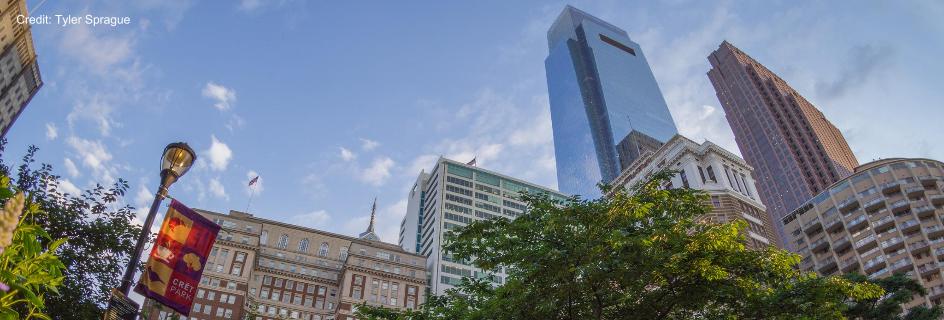- About GPA
- Global Events
- GLOBAL NEWS FROM PHL
- Global Directory
- World Heritage City
- Sustainable Development Goals (SDGs)
- Global Philadelphia Role on Sustainable Development Goals
- Completed Sustainable Development Goals
- SDG#1: No Poverty
- SDG #2: Zero Hunger
- SDG#3: Good Health & Well-Being
- SDG#4: Quality Education
- SDG#5: Gender Equality
- SDG#6: Clean Water & Sanitation
- SDG#7: Affordable and Clean Energy
- SDG #8: Decent Work and Economic Growth
- SDG #9: Industry, Innovation, and Infrastructure
- SDG#10: Reduced Inequalities
- SDG#11: Sustainable Cities and Communities
- SDG#16: Peace, Justice and Strong Institutions
- SDG#17: Partnerships for the Goals
- Press
Home ›
Dr. Judith Rodin Receives PCFA's Edmund N. Bacon Prize
Posted on March 4, 2015

Related
Organization
Bénédicte Clouet, for GPA -- Whether they were colleagues from her time as the president of the University of Pennsylvania, old friends, renowned architects or just curious onlookers, many well wishers came to see Judith Rodin, President of the Rockefeller Foundation, receive the 2015 Edmund N. Bacon Prize for her continuing contributions to the built environment.
The award was presented by the Philadelphia Center for Architecture (1218 Arch St.) The ceremony and accompanying talk was hosted at the Moore College of Art and Design (1916 Race St.)
Since joining the foundation in 2005, Dr. Rodin has recalibrated its focus to meet the challenges of the 21st century and today it supports and shapes innovations to expand opportunity worldwide and build greater resilience by helping people, communities and institutions withstand acute shocks and chronic stresses.
The evening started with a presentation of the winning projects of the 2015 Better Philadelphia Challenge, an urban design competition that addressed the sustainable development of Petty Island, a vacant island between Philadelphia and Camden, and the reimagination of our relationship with the Delaware river. A team from Cornell University won the challenge with "FOODWORX," a project involving a mix of agricultural sustainability and riverfront redevelopment.
Sandra Shea, the editorial page editor of the Philadelphia Daily News, chaired the discussion and introduced Dr. Rodin’s new book, The Resilience Dividend: Being Strong in a World Where Things Go Wrong. Although it deals with the notion of crisis and disaster -- the most recent example of which might be the terrorist attack on Charlie Hebdo in Paris -- it also promotes a surprising pathway to hope and optimism by showing how people, organizations, businesses, communities and cities have developed resilience in the face of otherwise catastrophic challenges.
Resilience, as defined by Dr. Rodin, is “the capacity to bounce back from a crisis, learn from it and achieve revitalization,” including the ability to prepare pre-emptively, recover and take advantage of the new opportunities created by the disruption.
“If crisis is becoming the new normal, we have to integrate it,” Dr. Rodin said. In 2011 alone, $380 billion was spent on recovery from natural disasters, which is not a sustainable path.
“Our goal should be to manage the unavoidable and to avoid the unmanageable,” she added.
During the talk, she stressed that under the dramatic collision of the three trends of urbanization, globalization and climate change, our problems are more complex and interconnected than ever before. We do not have the luxury of solving problems one at a time and should instead focus on leveraging resources and finding the tools and processes that will help solve various issues simultaneously. Disruptions are inevitable, but disasters aren’t. The degree of devastation can be mitigated, and building resilience should become a key economic strategy for cities all around the world. With an integrated approach to resilience, disruption can be turned to advantage and crises can become opportunities.
Hurricane Katrina highlighted New Orleans’ lack of preparedness for a major flood as well as the insufficiency of economic and social infrastructures in the city. New Orleans has since rebuilt its education system, diversified its economy and built more economic housing with resilient design. People used the crisis to revitalize the city.
This is where the 100 Resilient Cities Challenge funded by the Rockefeller Foundation can help make a difference. By 2050, 75 percent of the world’s population will live in cities. There is also evidence to suggest that 50 percent of the infrastructure that will be needed in the next 50 years hasn’t been built yet, so it is critical to integrate resilience into the culture of urban development.
800 cities, including Philadelphia, expressed interest in being part of this initiative. 67 have already been selected to receive funding for a Chief Resilience Officer, technical support and access to services to aid in development and implementation of resilience plans. Dr. Rodin’s idea is to create a real “resilience bond” between those cities that will disseminate the building of a global practice of resilience among governments, NGOs, the private sector and individual citizens.
After doing so much under her tenure at the University of Pennsylvania to revitalize West Philadelphia’s neighborhoods, Dr. Rodin could not leave without a little shout out to her city. She shared her hope that Philadelphia join the elite ranks of the 100 Resilient Cities, which was enthusiastically received by a receptive hometown crowd.
Image courtesy of the Philadelphia Center for Architecture.







